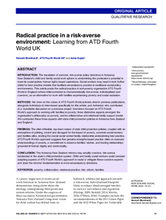This report examines and shares learnings from ATD Fourth World UK's social work practice framework with families experiencing poverty, discussing its strengths-based collaborative approach to build relationships and reduce power imbalances between practitioners and families. Implications for the feasibility of implementing this framework in child protection social work practice and policy in Aotearoa New Zealand is also addressed.
"Overlooking poverty’s impact on families not only sidesteps addressing underlying structural issues of inequality but also obfuscates any revelation about how the system might unfairly target people in material deprivation. " (p. 23)
Abstract
INTRODUCTION: The escalation of coercive, risk-averse policy directives in Aotearoa New Zealand’s child and family social work sphere is undermining the profession’s potential to meet its social justice, human rights based aspirations. Social workers may need to look further afield for best practice models that facilitate emancipatory practice in neoliberal social policy environments. This article posits the radical practice of anti-poverty organisation ATD Fourth World in England (where child protection is characteristically risk-averse, individualised and coercive), as an alternative for work with families experiencing poverty and social exclusion.
METHODS: We drew on the voices of ATD Fourth World activists cited in previous publications, alongside Activists(a-d) interviewed specifically for this article, and Activist(e) who contributed at a roundtable discussion on a previous project. Interviews focused on ATD Fourth World’s approach to working with families in poverty; three distinctive aspects emerged: the organisation’s philosophy on poverty, and its collaborative and relational family support model. We contrasted these three aspects with state child protection policies in Aotearoa New Zealand and England.
FINDINGS: The often inflexible, top-down nature of state child protection policies, coupled with an atmosphere of policing, control and disregard for the impact of poverty, constrain social workers and families alike, eroding the crucial social worker/family relationship underpinning best practice. ATD Fourth World’s approach suggests that genuine strengths-based practice relies on nuanced understandings of poverty, a commitment to advance families’ wishes, and trusting relationships grounded in human dignity and commonality.
CONCLUSION: The Aotearoa New Zealand reforms may amplify coercive, risk-averse tendencies in the state’s child protection system. Child and family social workers could consider adapting aspects of ATD Fourth World’s approach to resist or mitigate these coercive aspects and steer the reforms’ implementation in more emancipatory directions.

